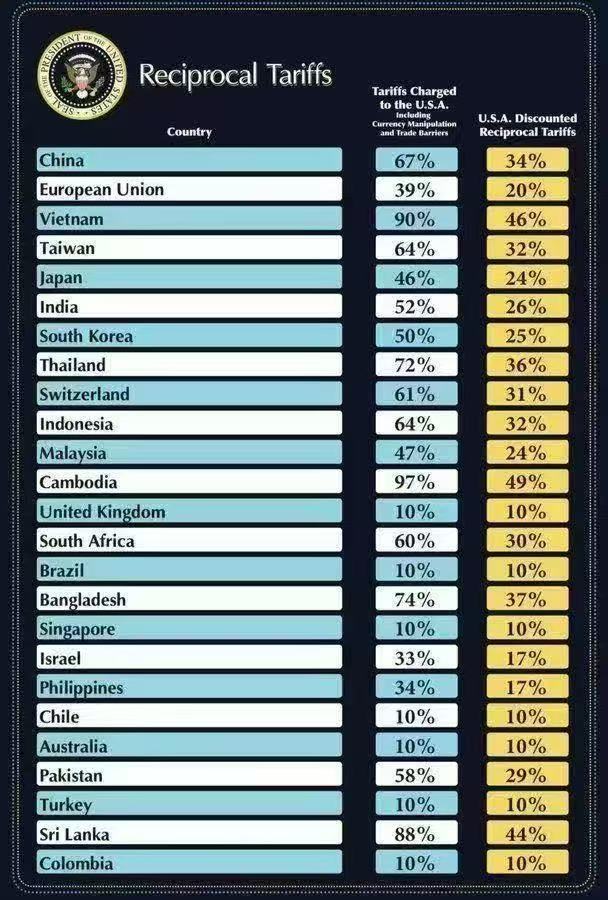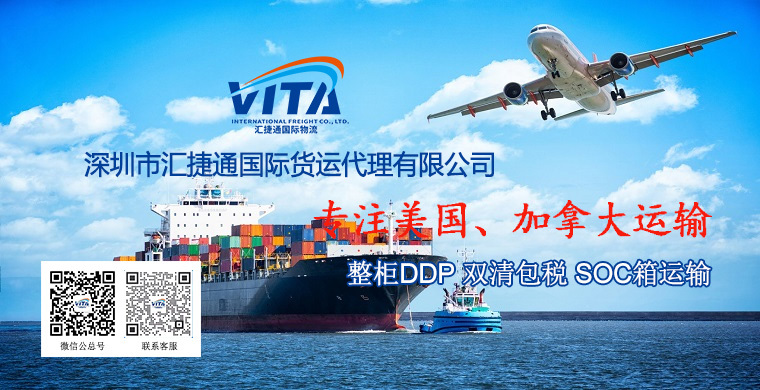All categories >
Global markets rocked! Up to 50%, Trump's "reciprocal tariffs" announced
Categories:
News Center
News
Time of issue:
2025-04-03 17:11
Views:

On April 2, 2025, US President Trump signed two executive orders at the White House concerning so-called "reciprocal tariffs," announcing that the US would impose a 10% "minimum benchmark tariff" on trading partners and higher tariffs on certain trading partners. The introduction of this policy was like a bombshell dropped into the lake of the global economy, instantly causing violent fluctuations in global markets.
According to Trump's statement, the US will impose a 10% benchmark tariff on all countries, effective April 5. At the same time, the US will impose higher tariffs on countries that impose higher tariffs on the US. For example, the tariff on the EU is 20%, 10% on imports from the UK, 31% on imports from Switzerland, 26% on imports from India, 25% on products from South Korea, 24% on imports from Japan, 36% on products from Thailand, 46% on products from Vietnam, 49% on products from Cambodia, and 50% on products from Lesotho. In addition, Trump also announced that a 25% specific tariff on the automotive industry will officially take effect on April 3 local time.

Violent Reaction in Global Markets
Following Trump's announcement of "reciprocal tariffs," major US stock index futures plunged. As of press time, Dow futures fell 0.49%, S&P 500 futures fell 1.59%, and Nasdaq 100 futures fell 2.31%. Tech stocks were hit hard, with Apple falling 7.5% after the US market closed, Tesla falling 5%, and Nvidia falling 4.4%. Asia-Pacific stock markets were also affected. On April 3, the Nikkei 225 index opened down 1.92%, with the decline at one point exceeding 4%; South Korea's KOSPI index opened down 2.73%.
The US dollar index fell 0.49% to 103.73. Meanwhile, non-US currencies rose, with the yen rising 1% against the dollar, reaching its highest level since March 14; the euro also rose 0.21% against the dollar. The offshore renminbi exchange rate against the US dollar fell to 7.3475 at one point.
International oil prices plunged during the session, with ICE Brent and WTI crude oil both turning negative, closing down 1.15% and 0.66%, respectively. International gold prices, however, rose sharply on risk aversion, with COMEX gold up 1.41% and London gold up 0.7%. As of press time on April 3, COMEX gold briefly broke through $3190 per ounce, and London gold was at $3151.08 per ounce.
Trump's "reciprocal tariff" policy ostensibly aims for so-called "fair trade," but in substance is a "tit-for-tat" strategy. The implementation of this policy could lead to a restructuring of the global trade landscape. The average US tariff rate on China will rise from 20% to 34%, and if other trade barriers are added, the cost of Chinese exports to the US could increase by 15%-20%. Export-dependent industries such as textiles and clothing, and home appliances will be the first to be affected. In 2024, China's textile and clothing exports reached $301.1 billion, of which about 18% were to the US. The tariff increase could lead to order transfers to Southeast Asia.
The US's imposition of a 25% tariff on imported cars and parts directly impacts Chinese car exports (about 800,000 vehicles exported to the US in 2024) and electronics manufacturing (laptop exports to the US account for over 40%). Japanese automakers Toyota and Honda's stock prices have already plummeted by 9% due to tariff expectations, and related Chinese industries may face similar pressure.
Economists generally believe that a "tit-for-tat" strategy is not an effective trade policy, but may instead lead to global trade uncertainty, disrupt US supply chains, and increase costs for US consumers. In addition, this policy could also damage global supply chains and create enormous uncertainty for the development of global value chains. Experts predict that Trump's tariff policy could negatively impact the US economy by 0.1% to 0.3%, resulting in losses of $28 billion to $83 billion.
In response to Trump's "reciprocal tariff" policy, countries around the world have issued statements. Traditional allies such as the EU, Canada, and Mexico have said they will take countermeasures. Australian Prime Minister Albanese has also said that Australia will not give in to the US, and there is no room for negotiation on this issue. At the same time, some countries may choose to compromise, such as India and Brazil, which may adjust their tariff policies due to concerns about trade retaliation.
Restructuring of the Global Trade Landscape
Trump's "reciprocal tariff" policy is an "earthquake" in global trade. The implementation of this policy could trigger retaliatory trade measures worldwide, further exacerbating international trade tensions. However, the long-term impact of this policy will depend on the responses of various countries and the global economic reaction. For the US, this policy may protect some industries in the short term, but in the long run, it could cause greater harm to the US economy. For the global economy, this policy could trigger a new trade war, further increasing global economic uncertainty.
In today's globalized economy, the rise of protectionism undoubtedly poses a huge challenge to the global economy. Trump's "reciprocal tariff" policy has not only affected the economic interests of the United States itself, but has also had a profound impact on the global trade landscape and economic growth. In the future, countries need to strengthen cooperation, resolve trade disputes through dialogue and consultation, and jointly promote the stable development of the global economy.

Shenzhen Huijietong International Freight Forwarding Co., Ltd. - Professional US Line Transportation Services
In the field of US line transportation, Shenzhen Huijietong International Freight Forwarding Co., Ltd. has become a trusted choice for many customers, thanks to its professional services and extensive experience. Huijietong International Freight Forwarding Co., Ltd. focuses on US line transportation, providing comprehensive logistics solutions, including sea, air, land transportation, and warehousing services. The company maintains close cooperation with major shipping alliances and can provide flexible space arrangements and efficient transportation services according to customer needs.
Choosing Shenzhen Huijietong International Freight Forwarding Co., Ltd. means choosing professional, efficient, and reliable logistics services. For more details, please visit [Huijietong official website www.szvif.com]
For US transportation, choose Huijietong!
Shenzhen Huijietong International Freight Forwarding Co., Ltd., your professional US line transportation partner.
Service Hotline: 0755-82171929 13560787209

WeChat QR Code
Follow us to get the latest updates on global shipping and trade!
Keywords:
US tariffs,Equivalent tariffs,US Trade










